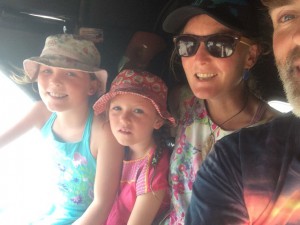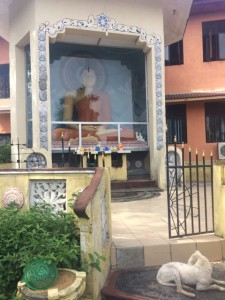Things have changed since my partner Steve and I were last in Sri Lanka. We travelled here for a month in 1999 during a brief ceasefire during the Tamil Tiger years. I’ve always had a fascination with islands and Sri Lanka didn’t disappoint despite our travel being restricted to avoiding the then more dangerous north of the island. Stunning hill country with tea plantations, pilgrimage walks up steep 2000m peaks, elephants and golden beaches along the dry east coast and the annual Kandy festival parading the Buddha’s tooth. The warmth and great generosity of the Sri Lankan people also made a great impact meaning that when we started planning my elective, Sri Lanka was an easy choice. Fast-forward around 18 years later and we arrive back on this now calm and war-free island with our two daughters aged 7 and 9 for a new family adventure. We head south on the train to Galle which will be our home for the 2ndhalf of my elective, having placements firstly at the Mahamodara maternity hospital and secondly with the Paediatric Department at Karapitiya Hospital.
First day at Mahamodara is immediately an eye-opener: consultant ward round in the antenatal ward, around 40 women at varying stages of pregnancy lie in beds unseparated by curtains awaiting examination and management plans. Mahamodara is a free government-funded hospital and is the largest maternity hospital in southern Sri Lanka. Rural and impoverished women, many of whom are Tamil, Hindu-speaking ‘tea pluckers’ from the estates further north in the hill country, are highly represented in the patient population presenting commonly with growth restricted foetuses and iron-deficiency anaemia. While in the more affluent women, gestational diabetes is an increasing problem. The consultant goes through the women’s bedside drawers commonly finding bananas, biscuits and sweets, after some smiles and a quick telling-off, the women are educated about the importance of a low-sugar diet.
It’s amazing to watch the effortless way the doctors negotiate their way through using both English and Sinhala in the ward round. All patient notes and most communication between the doctors is conducted in English however when speaking to the patients or as the consultant explained ‘when something from the heart needs to be said then we use Sinhala’.
There are three other elective students here at the moment and we are encouraged by the consultant to examine women, with their consent, particularly those with breech presentations, with twins and with growth-restricted foetuses. I feel really lucky to have this fantastic opportunity for real hands-on learning and I can feel my confidence increasing with this key obstetric clinical skill.
The consultant tells me that we’re lucky to be one of the few students on the ward as usually it is busy with local Sri Lankan medical students but for the past six months every Sri Lankan student has been on strike, in protest against the opening of a fee-paying private medical school. Education, including university is free to all Sri Lankans and entry into medical school is through school-based achievement. The protestors are concerned that the private school doesn’t meet educational standards and that it could erode the principle of free education in Sri Lanka.
Here is a link to a recent article on the issue as I found it raises some interesting issues:
Why Doctors and Students Are Protesting Against Sri Lanka’s Only Private Medical College
Judging from everything I have seen and learnt about on my first day I am really happy to have chosen to return to this diverse and beautiful country for my elective.



No comments yet.
Leave a comment